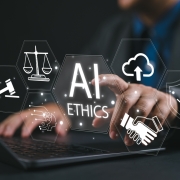Legal Remedies for Addressing Censorship and Racial Bias in ChatGPT
Editorial credit: Alex Photo Stock / shutterstock.com
Introduction
Artificial Intelligence (AI) technologies like ChatGPT are at the forefront of the digital revolution, providing users with answers, insights, and creative content. However, as with any tool shaped by human design, AI systems are not immune to censorship or racial bias. These issues can significantly undermine trust and raise ethical, social, and legal concerns.
When ChatGPT engages in censorship—intentionally or otherwise—it limits access to information or stifles diverse perspectives. Similarly, if it exhibits racial bias in responses, it can perpetuate stereotypes, discrimination, and inequity. This analysis provides a deep dive into the legal remedies available to users and stakeholders to address such behavior, while proposing actionable steps to foster accountability and transparency.
Understanding Censorship and Racial Bias in ChatGPT
Censorship in AI Systems
Censorship in AI refers to situations where:
- Selective Suppression of Content: Refusal to address certain queries or perspectives.
- Algorithmic Filtering: Preprogrammed exclusions of politically sensitive or controversial viewpoints.
- Distorted Output: Skewed representations of facts or ideas based on underlying dataset biases.
Such behaviors could stem from deliberate programming choices or unconscious biases in training data.
Racial Bias in AI Responses
Racial bias manifests in:
- Stereotypical Outputs: Reinforcing racial tropes in answers or creative content.
- Unequal Access: Providing different quality or tone in responses depending on racial or cultural context.
- Data Imbalances: Historical prejudices encoded in the datasets used for training AI models.
Both censorship and racial bias may violate ethical guidelines, undermine user trust, and, in some cases, contravene legal norms.
Legal Frameworks Governing AI Accountability
Constitutional Protections Against Censorship and Bias
- Freedom of Expression
In the United States, the First Amendment protects free speech. While private entities like ChatGPT are not directly bound by this, they could face challenges if:- They act as quasi-public platforms, akin to public utilities.
- Their practices stifle the free exchange of ideas, violating societal norms tied to information equity.
- Equality Before the Law
Constitutional principles such as the Equal Protection Clause (Fourteenth Amendment) prohibit discriminatory practices by public entities. While private companies are not directly subject to this clause, courts have increasingly examined the societal impacts of private platforms, particularly when their services wield significant influence.
Civil Rights and Anti-Discrimination Laws
U.S.-Based Laws
- Civil Rights Act of 1964: Discriminatory practices that disproportionately harm racial or ethnic groups could be challenged under this statute, particularly in public accommodation or federally funded contexts.
- Fair Housing Act (FHA) and Equal Credit Opportunity Act (ECOA): If biased AI outputs affect decisions related to housing, credit, or employment, these laws could be invoked.
International Standards
- International Covenant on Civil and Political Rights (ICCPR): Prohibits discrimination, including through technological systems, ensuring equal treatment regardless of race or ethnicity.
- General Data Protection Regulation (GDPR) (EU): Mandates fairness, transparency, and accountability in automated decision-making, offering remedies against biased AI responses.
Consumer Protection and Accountability Laws
- Federal Trade Commission Act (FTC Act)
The FTC prohibits “unfair or deceptive practices.” Censorship or racial bias in ChatGPT could violate this law if:- AI systems fail to disclose limitations or risks associated with their outputs.
- Consumers are misled about the impartiality or accuracy of responses.
- State Consumer Protection Laws
Many states have laws against deceptive practices that can apply to AI services engaging in misleading or discriminatory behavior. - Algorithmic Accountability Acts
Emerging laws in jurisdictions such as the U.S. and EU require transparency and bias audits for AI systems, creating enforceable standards for fairness.
Contractual and Torts-Based Remedies
Breach of Contract
ChatGPT operates under Terms of Service (ToS) agreements. If these agreements include guarantees of neutrality or nondiscrimination, biased or censored responses could constitute a breach of contract. Users may pursue remedies, such as:
- Refunds or Compensation: For loss of services or reliance on inaccurate outputs.
- Specific Performance: To compel corrective actions, such as retraining the AI model.
Negligence and Product Liability
Developers of ChatGPT may face claims if:
- They fail to address known biases or censorious practices.
- They release AI systems without adequate testing or safeguards. Proving negligence would require showing a breach of the duty of care owed to users.
Defamation
Biased or misleading outputs that harm reputations could trigger defamation claims, particularly if the AI’s statements are demonstrably false.
Remedies Through Legal Action
Injunctive Relief
Courts can issue orders to:
- Cease biased or censorious practices.
- Modify algorithms to ensure compliance with anti-discrimination and transparency laws.
Compensatory Damages
Victims can seek financial compensation for:
- Emotional distress caused by biased responses.
- Tangible losses due to misinformation or discriminatory outputs.
Punitive Damages
In cases of willful or egregious misconduct, courts may award punitive damages to deter future violations.
Declaratory Judgments
Courts may issue declaratory judgments to clarify whether specific practices violate legal norms, establishing precedents for AI accountability.
Non-Litigation Remedies
Regulatory Complaints
Victims can file complaints with relevant agencies, such as:
- Federal Trade Commission (FTC) for deceptive or unfair practices.
- Equal Employment Opportunity Commission (EEOC) if bias in AI outputs affects hiring decisions.
Advocacy and Collective Action
Civil rights groups and advocacy organizations can:
- Petition for stricter regulatory oversight of AI systems.
- Organize class-action lawsuits to address systemic issues.
Voluntary Audits and Certifications
Engaging third-party auditors to evaluate AI models can help identify and rectify issues proactively, offering a less adversarial route to improvement.
Challenges in Pursuing Remedies
- Attribution of Responsibility
- AI systems are complex, with responsibilities often divided among developers, data providers, and platform operators.
- Determining which entity is liable can be challenging.
- Technical Expertise
- Understanding and proving bias or censorship requires significant technical expertise, which may not be readily available to plaintiffs.
- Contractual Barriers
- Terms of Service agreements often include arbitration clauses or liability waivers, limiting legal recourse.
- Lack of Established Precedents
- AI-related legal disputes are still emerging, leaving courts with little precedent to guide decisions.
Proactive Measures to Address Censorship and Bias
- Transparency Initiatives
- Developers should disclose how ChatGPT is trained, including dataset sources and bias mitigation strategies.
- Bias Audits
- Regular audits by independent experts can identify and address censorship or racial bias in AI systems.
- Ethical Guidelines
- Adopting industry-wide ethical standards can help align AI practices with societal values of fairness and equity.
- User Feedback Mechanisms
- Allowing users to report problematic responses can help developers fine-tune systems and address concerns in real time.
Call to Action (CTA)
Ensuring accountability and fairness in AI systems like ChatGPT is a shared responsibility. Whether you’re a user, developer, or policymaker, you can take steps to foster ethical AI practices:
- Demand Transparency: Advocate for clearer disclosures about how AI systems handle sensitive topics and mitigate bias.
- Report Issues: If you encounter censorship or biased responses, report them to the developers or relevant regulatory bodies.
- Engage in Advocacy: Support initiatives aimed at creating robust AI accountability standards.
- Educate Yourself: Stay informed about AI’s ethical, legal, and societal implications.
Let’s work together to ensure that AI serves as a tool for inclusivity, fairness, and progress—not a source of division or inequality.












Leave a Reply
Want to join the discussion?Feel free to contribute!